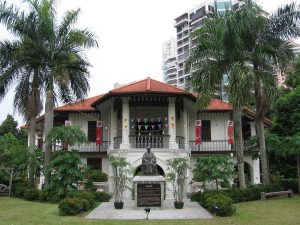The Sun Yat Sen Nanyang Memorial Hall and the Chinese Community of Singapore: History, Repositioning and Contestation
November 15, 2021

In ‘The Sun Yat Sen Nanyang Memorial Hall and the Chinese Community of Singapore: History, Repositioning and Contestation’ (A General History of the Chinese in Singapore, 2019) Associate Professor Jianli Huang (NUS Department of History) considers the intentional positioning of the Sun Yat Sen Nanyang Memorial Hall within a Sino-centric shift of Singaporean nation-building during the 1990s.
George Yeo (Minister for Information and the Arts, Health, Trade & Industry, and Foreign Affairs between 1988 and 2011) is highlighted as a crucial and prominent figure in the re-imagining vision of ‘Big Singapore’. A/P Huang argues that he shifted Singapore away from the island’s geography (Southeast Asian) and colonial legacies (British), choosing instead to align itself with the birth of Republican China in 1911. This realignment was shown to be a cultural pushback of sorts, coming as it did in the early 1990s after the shutdown of purely Chinese language education in the 1980s, and the introduction of national laws requiring English to be the first language of instruction in all Singapore schools by 1987.
The text discusses the motives behind this historical re-orientation around the figure of Sun Yat Sen as both a confluence of contemporary economic expediency, a resurgent and business friendly China in the post-cold war, and the need for a national narrative away from more obvious candidates such as first-generation PAP political leaders. This historical connection was used to impress, upon Singaporeans and foreigners alike, ‘that the Singapore Chinese are not just people from a small island, but people who came from a very rich past with a great tradition.’
A/P Huang challenges the authenticity behind this positioning of Sun Yat Sen, as a reductionist presentation of both the 1911 revolution and of Singapore, noting that Sun Yat Sen’s political career was known more for its failures than successes, and that there was, arguably, minimal political interactions between Singapore and Sun Yat Sen. Within both the PRC and Taiwan, Sun Yat Sen encapsulates the idea of the modern genesis of republican China. However, A/P Huang contends that he was not a founding father of Singapore.
Read the full article here.
